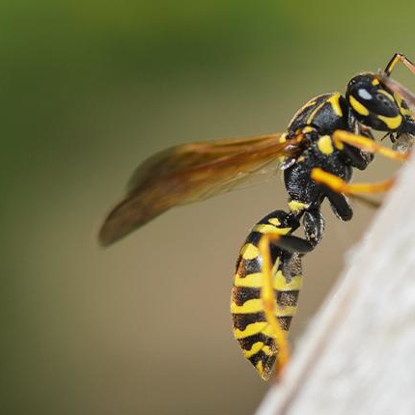
Stinging Insects

About
What are stinging insects?
Stinging insects are eco-important pests as they help to pollinate plants and control the population of nuisance insects. If possible, stinging insects should be protected. However, when they decide to place their nest in a high traffic area of your yard, on your home, or in your home, you need to address the situation in order to avoid painful stings. Having a stinging insect nest where your family lives and plays daily causes stress and lowers your ability to enjoy your yard.
Wasps, mud daubers, yellow jackets, hornets, and carpenter bees are all examples of stinging insects living throughout Baton Rouge, Louisiana.
Are stinging insects dangerous?
Not only is being stung by a stinging insect painful, but it can be very dangerous, depending on the person. Stinging insects have venom that is strong enough to trigger mild to very serious or life-threatening allergic reactions in people.
Additionally, if stinging insects nest behind your home's walls and then abandon their nest, the hives attract feeding insects or as the nest decays will damage insulation, drywall, or flooring.
You should always take care around stinging insects, and if you discover a nest on your property, take immediate action and call River City Termite & Pest Control!
Why do I have a stinging insect problem?
These pests become active in the spring but are most active in the late summer and early fall. During those periods, workers are out and about foraging for food to feed their very large colonies and to store away for overwintering queens. Stinging insects feed on and gather a variety of things, including plant nectar, pollen, other insects, sweet liquids, and proteins.
Stinging insects will become a problem on any property that offers them food or a sheltered spot to build their nests. Properties with many trees, a lot of flowering vegetation, gardens, and near sources of water are the most attractive to stinging insects. Some species also like to forage for food in recycling bins, trash cans, compost bins, and outdoor eating areas.
Where will I find stinging insects?
You'll often see stinging insects buzzing around your home, deck, porch, trees, and gardens while building their nests or gathering food to feed their colonies. When living or feeding close to homes, they often find their way inside.
Stinging insect nests in a variety of places above, on, and below the ground. Trees, tree voids, utility poles, roof eaves, chimneys, and doorways are common nesting spots for stinging insects.
Ground nesters place their nests, under woodpiles, in tree stumps, and under piles of dense shrubbery or other vegetation. Some species will place their nest in ground holes or the abandoned nests of small animals.
The carpenter bee is unique in that females create their nests in pieces of wood (preferring softwood and untreated pieces of wood). Their nesting habits can damage the structure of the wooden items they choose, such as playsets, furniture, trim, shingles, fencing, and more.
In addition to our yards, stinging insects are often problematic at outdoor events where there's food. Festivals, fairs, picnic areas, and restaurants with outdoor seating are often plagued by stinging insects.
How do I get rid of stinging insects?
Eliminate stinging insects and other pests from your Louisiana residential or commercial property with the help of River City Termite & Pest Control. We offer personalized services you can count on to eliminate problems with common Louisiana pests and keep them from returning.
Get rid of stinging insects from your property by reaching out to River City Termite & Pest Control. We are happy to work with you to ensure that your Baton Rouge area home or business is kept free of stinging insects. To learn more about our home pest control or commercial pest control services, give us a call today!
How can I prevent stinging insects in the future?
Help keep stinging insects out of your home with the following easy-to-implement stinging insect prevention tips:
- Keep windows and doors closed or use screens without rips to keep stinging insects out of your home.
- Trim back shrubbery and tree branches from your home's exterior walls.
- Remove things like fallen trees, trees stumps, and other debris where stinging insects can nest.
- As fun as running through the grass in bare feet is, keep your shoes on to avoid accidentally being stung by a bee, wasp, or hornet.
- After eating outside, clean up and remove leftover food and drinks.
- Keep trash cans and recycling bins covered to stop stinging insects for foraging for food in them.
- Reduce sources of water by keeping gutters clear of debris, fixing low-lying areas, and removing containers that collect water.